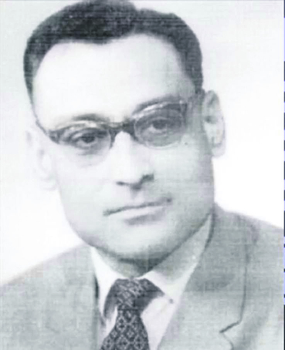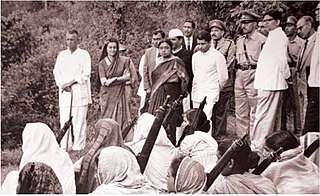Events in the year 1975 in the Republic of India.
Events in the year 1971 in the Republic of India.
Events in the year 1977 in the Republic of India.

The Janata Party is an unrecognised political party in India. It was founded as an amalgam of Indian political parties opposed to the Emergency that was imposed between 1975 and 1977 by Prime Minister Indira Gandhi of the Indian National Congress. In the 1977 general election, the party defeated the Congress and Janata leader Morarji Desai became the first non-Congress prime minister in independent modern India's history.
These are the events that happened during 1973 in the Republic of India:
Events in the year 1976 in the Republic of India.

The Emergency in India was a 21-month period from 1975 to 1977 when Prime Minister Indira Gandhi declared a state of emergency across the country by citing internal and external threats to the country.
Events in the year 1968 in the Federal Republic of India.

Justice Jagmohanlal Sinha was an Indian judge known for his 1975 ruling in the State of Uttar Pradesh v. Raj Narain lawsuit, which invalidated the election of Prime Minister Indira Gandhi.

Raj Narain was an Indian freedom fighter and politician. He won in a famous electoral malpractice case against the then Prime Minister Indira Gandhi, which led to her disqualification and imposition of the Emergency in 1975. He defeated Gandhi during the 1977 Lok Sabha elections.
The Bihar movement, also known as the JP movement, was a political movement initiated by students in the Indian state of Bihar against misrule and corruption in the state government, in 1974. It was led by the veteran Gandhian socialist Jayaprakash Narayan, popularly known as JP. The movement later turned against Indian Prime Minister Indira Gandhi's government in the central government. It was also referred to as Sampoorna Kranti.

Rameshwar Nath Kao was an Indian spymaster and the first chief of India's external intelligence agency, the Research and Analysis Wing (R&AW) from its founding in 1968 to 1977. Kao was one of India's foremost intelligence officers, and helped build R&AW.

Satyendra Narayan Sinha was an Indian politician and statesman, participant in the Indian independence movement, a leading light of Jaya Prakash Narayan's ‘complete revolution’ movement during the Emergency and a former Chief Minister of Bihar. Affectionately called Chhote Saheb, he was also a seven-time Member of Parliament from the Aurangabad constituency, a three-term Member of the Bihar Legislative Assembly, and a Member of the Bihar Legislative Council once. Regarded to be one of India's most influential regional people of the time, his reputation was synonymous with being a strict disciplinarian and tough taskmaster.

Ekkadu Srinivasan Lakshmi Narasimhan is an Indian former civil servant and politician who served as the first Governor of Telangana. He assumed office of the Governor of Andhra Pradesh on 8 December 2009 until 23 July 2019 making him the longest-serving governor of the state. Later he took on 2 June 2014 as the 1st Governor of Telangana as additional charge. A retired Indian Police Service officer, he previously served as the Director of the Intelligence Bureau from February 2005 to December 2006. He also served as the Governor of Chhattisgarh from 2007 to 2009. Narasimhan served as governor for 12 years making him the longest-serving governor in India.

The sixth legislative assembly election of Tamil Nadu was held on 10 June 1977. All India Anna Dravida Munnetra Kazhagam (AIADMK) won the election, defeating its rival Dravida Munnetra Kazhagam (DMK). M. G. Ramachandran, the AIADMK founder and a prominent Tamil film actor, was sworn in as Chief Minister for the first time. The election was a four-cornered contest among the AIADMK, DMK, the Indian National Congress (INC), and the Janata Party.
The State of Uttar Pradesh v. Raj Narain was a 1975 case heard by the Allahabad High Court that found the Prime Minister of India Indira Gandhi guilty of electoral malpractices. The ruling on the case that had been filed by the defeated opposition candidate, Raj Narain, Justice Jagmohanlal Sinha invalidated Gandhi's win and barred her from holding elected office for six years. The decision caused a political crisis in India that led to the imposition of a state of emergency by Gandhi's government from 1975 to 1977.

Mohan Dharia was a Union minister, a lawyer and social worker. During his last days he stayed in Pune. Dharia was an environmentalist and ran a non-government organisation Vanarai. He was elected to the Lok Sabha twice from Pune Lok Sabha constituency, first in 1971 as an Indian National Congress (INC) member and became a Minister of State, and later in 1977 as a Bharatiya Lok Dal member, and joined the Morarji Desai Ministry as Union Minister of Commerce. Prior to it, he remained member of the Rajya Sabha twice from INC, first 1964-1970 and then 1970- 1971
K. Sankaran Nair, known as Colonel Menon among his colleagues, was an Indian civil servant, diplomat and the director of Research and Analysis Wing. He served as the Indian High Commissioner to Singapore from 1986 to 1988 and was the last surviving member of the Indian Imperial Police. He was reported to have played a crucial role in the formation of Bangladesh, through R&AW operations during the Bangladesh Liberation War.

Phanindra Nath Banerjee was an Indian Police Service officer serving as Commissioner of the Special Bureau in Calcutta in the period 1968-1974.

The Directorate General of Security is an organisation of covert operations under India's Cabinet Secretariat. It is one of the four legally defined intelligence organisations of India and listed in the Schedule of the Intelligence Organisations Act, 1985, the other three being I.B., R&AW and NTRO. Since 1971, the Secretary, Research and Analysis Wing has usually held the post of Director General. This organisation used to be composed of Special Service Bureau, Aviation Research Centre, Special Frontier Force and Chief Inspectorate of Armaments. Since the shifting of SSB and CIOA to the Ministry of Home Affairs in 2001, DGS consists of ARC and SFF only. The Special Group, a non-Tibetan and Sarsawa-based unit of SFF, is also a DGS component.












